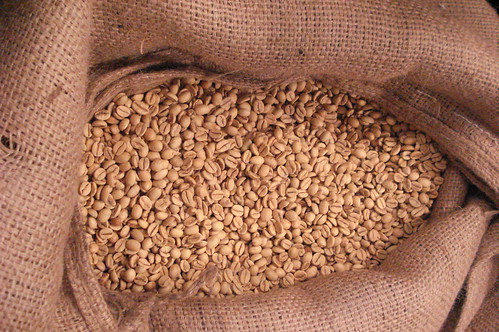This past Monday morning, a chatty gentleman came in during one of our rare late-summer quiet moments, and as I was (wo)manning the register at the time, we got to talking for a moment before he ordered.
"I'm just passing through town," he said, "headed home from Farm Aid."
Oh, cool, I responded. How was that?
He went on to tell me that it was lovely, that he was friends with the organizers, and that he worked for several nonprofit organizations dedicated to various efforts, including but not limited to encouraging restaurants to go green and/or local, supporting pro-farmer legislation, promoting the spread of organic agricultural techniques in the U.S., bringing whole foods to children in inner cities—all admirable projects.
Well, I said after a little small talk, what can I get for you?
"A large vanilla latte in a double cup, please."
Ok, I replied, that will be X dollars.
"X dollars?! Wow, are you serious?! What in the world!"
Surely some of you are nodding your heads at the irony of this, "double cup" aside?
Which brings us to today, when no less than three people have already forwarded me this highly appropriate New York Times article:
To Burundi and Beyond for Coffee’s Holy Grail
By Peter Meehan.
Sept 12, 2007
“Direct trade”…means, most simply, that the roasters buy their beans directly from the farms and cooperatives that grow them, not from brokers.…
Direct trade — which also means intensive communication between the buyer and the grower — stands in stark contrast to the old (but still prevalent) model, in which international conglomerates buy coffee by the steamer ship, through brokers, for the lowest price the commodity market will bear.
It also represents, at least for many in the specialty coffee world, an improvement on labels like Fair Trade, bird-friendly or organic. Such labels relate to how the coffee is grown and may persuade consumers to pay a little extra for their beans, but offer no assurance about flavor or quality. Direct-trade coffee companies, on the other hand, see ecologically sound agriculture and prices above even the Fair Trade premium both as sound business practices and as a route to better-tasting coffee.
Ours, like that at of many of our peers, is at the very least Fair Trade coffee, and most of Barrington's offerings are direct trade or "relationship coffee." There is a dedication to the farmers that extends to a dedication to the beans, and vice versa. We can sleep at night because our farmers get paid a decent (certainly by agricultural standards, if not, say, by Manhattan-apartment-rent standards) rate, and that we support programs that care for the well-being of their families and the education of their children.
The very foundation of the industry should be, in my humble opinion, the farmers and their health, safety and welfare, and here is a section of the coffee roasting, retail and extraction world that feels the same way. I work behind its counter because I know the beans we use are treated with respect every step of the way: from the ground out of which they sprout to the hands that pick and clean and care for them.
And so, to my friend with the Farm Aid T-shirt, sure, it's a little bit more than you'd pay at a run-of-the-mill coffee shop whose beans come from G-d knows where and whose farmers are paid in pennies, but think of how proud Willie, Neil, Dave and Johnny Cougar would be.

